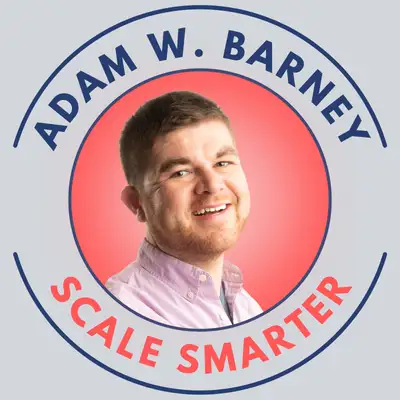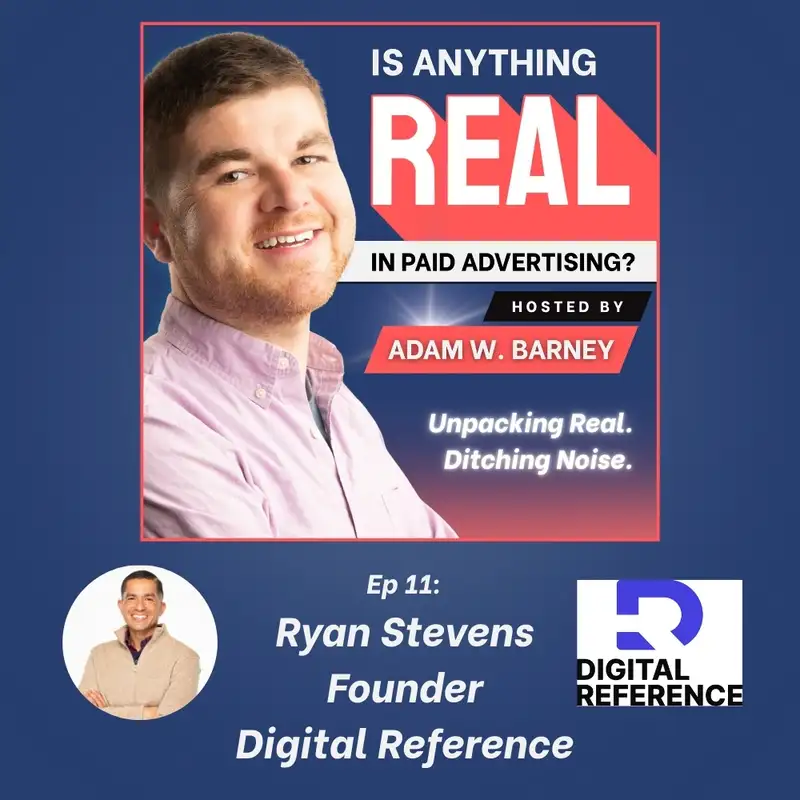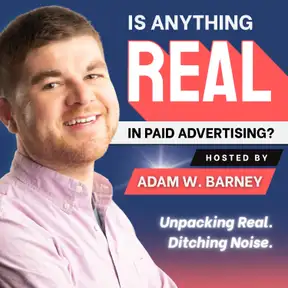Data That Cuts Through the Noise | Ep. 11 with Ryan Stevens (Digital Reference)
[00:08.6]
Welcome back to "Is Anything Real in Paid Advertising?" The show where we unpack what's real and what's just noise in the world of marketing founders and funnels. I'm your host, Adam W. Barney, and today's guest is here to challenge everything we think we know about the need for ads.
[00:25.0]
Ryan Stevens is the founder of DigitalReference.co and a content-first operator who believes that if you have to buy traffic, maybe your content just isn't cutting it. So welcome, Ryan. Thank you, Adam. Happy to be here. You once said those who can't build organic go to paid.
[00:42.8]
Let's dive into that take a little bit. Sure. I believe it wholeheartedly. Right. I think that we live in an age of instant gratification and so paid you, you know, quick inputs, for quick outputs, but at a cost.
[01:05.3]
Literally at a cost. And so I grew up in the professional world of building slow and organic traffic and organic content is a slow process.
[01:21.2]
And I think because of that, a lot of founders, leaders don't like it and don't spend the time to invest in it, nor have the patience to see the fruits. And let me say that I am not a patient person outside of content and SEO.
[01:39.0]
But I really do believe that a lot of businesses can't do it for one reason or another. And I think a lot of times it comes down to patience. All right. And I know you've spent most of your time in the content SEO world. Can you walk us a little bit through your journey there?
[01:55.9]
Sure. So, my first real foray into content marketing SEO was at a place called Clutch.co where we focused on building ratings reviews in the B2B professional service space.
[02:15.6]
And so, really, content is king, content is queen, and in those days, flashback to 10 years ago, this is, reviews.
[02:30.8]
Mostly text reviews. But one of the things that I don't think we ever took enough credit for is that at least for the first five, six years of our clutch journey, we did all of those reviews over the phone. So our team was talking with people, recording them.
[02:48.3]
Can you imagine recording a phone call? How the world has changed in 10 years. And then sending it off to a human to transcribe. Crazy. A human transcriber.
[03:07.0]
My mind flashes back, Ryan, to the classically understood court transcriber who used to sit there with, I'm not even sure it was a miniature typewriter, but that's what it always looked like to me was a miniature typewriter. It truly... Yeah, right. That was a job not so long ago.
[03:25.6]
Right. And so I think we complain a lot about other technology jobs going away but the transcribers have been complaining that their jobs have gone away for five, six, seven years. But that's all I say is that that was where I really got my start into content marketing and then through that a focus on SEO optimization.
[03:49.9]
But ultimately, and it's not too dissimilar from today, is that good content brings eyeballs. Google rewards good content. And so yeah, I was at clutch for 10 plus years and was able to build or grind my teeth there.
[04:09.2]
Gotcha. What do you say to founders these days who skip content and focus on content and jump straight into paid or performance marketing or that's the mindset that they think is the right one to employ when they first have a conversation with you?
[04:25.9]
I think this is a common thread in a lot of
[04:37.1]
functions in businesses. You know, payday I think is the manifestation of what marketing, of driving fast, or getting out over your skis, equivalent to sort of not meeting product market fit and in the product or operational space.
[04:56.6]
But I ultimately think that founders and usually through their investors are looking for quick wins and that for me I think is really dangerous.
[05:11.9]
And in some scenarios I think it works and it pays off. And the things that you know and your audience knows is that paid is great because you can measure it and you can track it but you have to continue to pay.
[05:27.9]
Right. And so whereas organic, it cost up front and it costs a bit to maintain but then you can, you can ride that for a really long time and that can really have great strong impacts on margins and in the future and allow businesses to dedicate that that marketing spend to other things.
[05:54.5]
It's almost taking that long term vision of ROI stacking by using content, using organic instead of having to, I mean I've worked with advertisers recently who you know, they drop a thousand, two thousand, three thousand dollars on paid channels and yet maybe they get some learnings, but it's not enough learnings.
[06:19.9]
And then you're basically starting back where you began the first time. Having no data to work off of even though you've thrown money into a paid channel but it hasn't paid off. Yeah, I think that's another flaw of where we're at today is that it's expensive to even get started.
[06:43.2]
And for paid channels to be effective
[06:51.0]
and achieve the ROI and ROAsS that you want it to achieve unique data. And that doesn't come at it $1k, $2k, $3,000. And that's like I think a really bitter truth for young companies is that any segment that has enough traffic or eyeballs, for $1-$3,000 is likely not super valuable traffic.
[07:23.5]
For you to learn and understand are you getting the users that you need or want for your business? And so that I think is sort of additive to hey really getting smart on your organic traffic and your organic strategy which I think In this day and age when founders and leaders can do so much by themselves.
[07:50.6]
In particular content generation, content marketing and outreach, all of these tools that help individuals do things that are related to content and SEO, I think it's a real miss for a lot of founders to start there and understand SEO.
[08:18.3]
you kind of have mentioned using B2B professionals as being at the core of your strategy. But thinking in that sort of market how, how does SEO still win in a very AI noisy and attention fractured landscape?
[08:36.6]
Especially having seen from my perspective of being in paid search for a number of years, that search engine results page has evolved. When you think about the way Google operates and it's not just the AI generated answers that pop up now in a lot of situations with Google.
[08:54.6]
But what does that do from a paid perspective? It pushes all those ads down the page and the actual organic listings even become less prominent in that traditional mindset of a search engine results page. Yeah. 100%.
[09:12.0]
One word that you mentioned that I will take us quickly there but I want, I'll get back to it but it's like it's the attention. Right. I think. Right. We are living in a world where attention is and eyeballs is everything. And your competitors, I can't remember who I heard or what podcast I listened to but you know, where they mentioned that you know, social media, while they're not a social media platform, social media are their competitors because ultimately they're looking for their users attention to focus on their app or their application.
[09:49.7]
And anytime that a social media push notification gets sent to your phone that pulls you out of their app that is their biggest competitor. Not you know, other like, not other like applications.
[10:05.2]
And I think that idea that attention is the gold that everybody's trying to mine is really, really interesting one. Hands with a lot of other human impacts.
[10:24.0]
I think we often criticize Gen Z as being the ones drawn to iPads and screens. But I think it impacts all of us. But that's to say that I don't think that we are going to be clicking on links or typing words in to our desktop or into our mobile and clicking on links for very long.
[10:55.3]
I think we've got a two year time frame before you know the big tech companies can fully revolutionize how we search and how we consume advertisements. Yeah, I think that we're right there.
[11:14.3]
I'm in this evolving landscape. What's a smart hybrid strategy for B2B founders from your work and your perspective? Well, I also think we're a capitalist society. Right? So that with that being said, people are going to want to figure out how to get their products and services, whatever the medium is, whether or not we're putting glasses back on, revive the Google Glass or we're you know, black mirror putting chips in our head.
[11:43.4]
There are going to be you know people are going to want to push their products and services to consumers. Right. And whatever platform that is. And whether or not it's voice or talking to your smart homes, there is going to be an algorithm that is created that helps those platforms understand what is good content.
[12:12.1]
Right. And so understanding how to, first keeping a pulse on on how search is changing. And you know the GPTs of the world are rising in usage.
[12:28.4]
And so I think any good marketers keeping a pulse on how to optimize their content for those, And same thing for organic marketers and same thing for paid marketers. Right? It's like all right, Perplexity. How do I, what, How do I what keywords?
[12:45.6]
How do I need to advertise here? And so while while the platform and the SERPs are going to change, they're still, at least for the foreseeable future, five years, let's say I don't know much longer than that, but five years, whatever that platform changes from, you know, a screen or your mobile screen or your desktop screen and they're being links that you can click whatever it changes to, there's going to be an algorithm behind it that paid or organic marketers are going to want to understand how to make sure that they can push their client or their businesses products and services to the top.
[13:30.8]
And so I think it's the, the platform changes but the sort of focus on trying to understand the algorithm behind the platform remains.
[13:47.7]
Interesting. I mean in that realm of your work, say you had to launch a startup from scratch with no budget. Ryan, what would you work on and do in your first 30 days? What would that first 30 look like? Funny you ask, kind of what I'm doing.
[14:06.5]
I think that the focus is on really trying to understand what I can and cannot do as an individual. Right. And that has been actually really eye-opening because there's certain activities and things that I really love to figure out and give that they give me joy and energize me and there's other things that I spend time to try to figure out and understand that are really draining and take a lot of time.
[14:42.5]
Right. And so I'm not a technical founder but I think we hear a lot these days of like everybody can be a coder and everybody can do this. And it's like okay, well yeah, still cookie-cutter type stuff and go to Claude to do these things and build these things.
[15:02.5]
But then it takes one small thing for you not to be able to do, to try to prompt and not, And you're all of a sudden spent, you know, five hours, six hours trying to change a feature, move a button.
[15:20.1]
And maybe again I'm not a technical person but I think that getting smart on the tools out there, what they can do, and what their limitations are is sort of the first thing. Right.
[15:37.3]
But specifically I've been focused on Content marketing. Right. I ultimately know it's a slow game and so, focused on getting smart on the key terms and the competitors, not necessarily from a product standpoint, but from competitors from a search and advertising standpoint.
[16:02.2]
Really understanding what they're focused on, has been my approach while I fumble through some of the technical stuff that I can do by myself and then seek support where I run into hurdles. I love it. Yeah.
[16:17.9]
What signal do you always feel comes into play when content is working long before traffic spikes? What does that spidey sense look like? Well, the spidey sense is sort of is the heart of hearts.
[16:38.5]
Are you building good content or not? Is the content helpful or not? Right. Are you putting content out there that does not exist in the form that you have created.
[16:55.1]
Right. Or are you entering a crowded market and putting the same type of content out there that everybody else has? Right. And. And I think that is a tough one to, that's a tough one to grapple with sometimes because at the end of the day, sometimes the only sort of method to rank for certain content is to provide very similar content to what's already out there because the algorithm, at least from a consumer, it looks like the algorithm is preferencing a certain type.
[17:33.5]
And so therefore you have to replicate what it's preferencing. That's frustrating, but that does happen. But the sort of spidey sense is, hey, there's actually a gap in information here that when I put these search terms into ChatGPT or into Google, I don't get the results that are actually helpful to what I'm looking for.
[17:58.4]
Yeah. Or I have to do another two or three steps to get to what information I want to find. And to me that's sort of the, Oh, I think there's actually a little pocket here that you can sort of thread that needle.
[18:16.3]
And do you think that that's about taking those two, three steps and shrinking them, to one step and getting closer to it? Yeah, right. that's exactly it. Right. Is anytime you're going from a top level search, to a bottom of the funnel search.
[18:40.6]
Well why isn't that bottom of the funnel search already exists? Right. And then you know, that gets closer to like long tail. And then you have to create a large mass of content to actually cover your bases.
[18:56.4]
But those are the type of things I think founders can really start to say. Right. Like all right, what gaps in information are on the web and how can my business, fill those. You know, to push product or services.
[19:13.8]
I love it. Awesome. Ryan, this has been a refreshing counterpoint to the paid advertising dominated world that most of us live in. For listeners who want to connect or explore DigitalReference.co, where should they head? DigitalReference.co.
[19:30.7]
From my past to become a fan of the .co as opposed to the .com. So digitalreference.Co. And you can find me at ryan@digitalreference.co Beautiful. And of course we'll have links to those below. And for the founder out there running cold ads with no content strategy, what's your real talk advice before they burn more budget?
[19:55.7]
Just don't make any enemies. Right? Yeah, don't make any of these. Right. You know, we are in a small pocket of time where content generation can be fast.
[20:11.7]
Good content generation can be fast. Right. Like I, you know, the sort of highbrow folks that are saying, all, everything that ChatGPT pushes out is garbage. No. Right. There are pockets of in the web of the web that relate to any product or service out there that you as a sole founder or a small team do content marketing of 20, 30 people, you know.
[20:39.9]
Right. And you know, and thoughtfully. Right. And it will take some uptake on what is good content marketing, what is good SEO. And that obviously is important, but SEO is not going away. You know the platforms, the platform, whether or not we're clicking on links, that is going away.
[20:59.5]
But until, you know, I won't dive too deep into politics, but we're not a capitalist society anymore. People are going to want to sell the products and services. I think that speaks to the nature. It all comes down to the humans that we all are.
[21:15.6]
Right. We all are. Right. All right, Ryan. Well, thanks again for joining us today on "Is Anything Real In Paid Advertising?", the show where we separate signal from the sea of noise. I'm Adam W. Barney. Be sure to subscribe, leave a review, and check the show notes for links to everything that Ryan and I covered today.
[21:35.2]
Thank you so much, Ryan. Thanks for having me.
Creators and Guests


